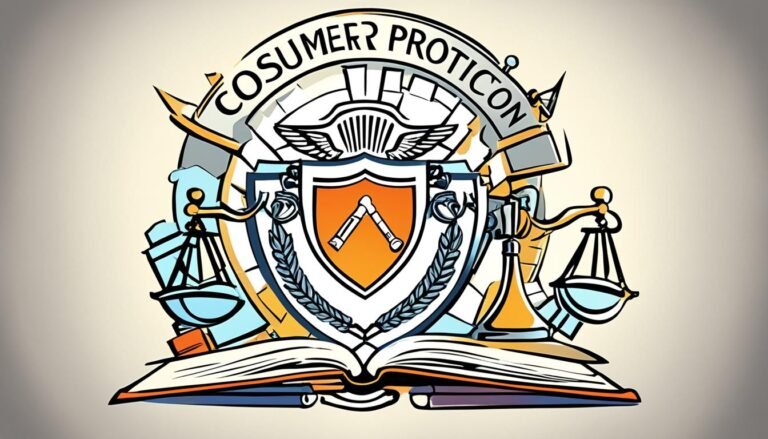Top RegTech Solutions for Compliance Mastery
Did you know that the RegTech market is projected to grow from $6.3 billion in 2020 to $16 billion by 2025? That’s a staggering Compound Annual Growth Rate (CAGR) of 20.3%! With the increasing costs of compliance and the need for faster transactions, businesses are turning to Regulatory Technology (RegTech) solutions to navigate the complex world of financial regulations.
RegTech software and compliance tools offer innovative solutions to streamline regulatory processes, automate compliance tasks, and ensure regulatory compliance. In this article, we will explore the top RegTech solutions and how they can help businesses master compliance in the ever-evolving regulatory landscape.
Key Takeaways:
- Regulatory Technology (RegTech) is a rapidly growing market projected to reach $16 billion by 2025.
- RegTech solutions help businesses automate compliance tasks and ensure regulatory compliance.
- Increased costs of compliance and the need for faster transactions are driving the adoption of RegTech solutions.
- RegTech solutions leverage technologies like machine learning, artificial intelligence, and blockchain to enhance compliance processes.
- RegTech solutions offer benefits such as increased efficiency, accuracy, and reduced risk.
What is Regulatory Compliance and Why is it Important?
Regulatory compliance refers to the adherence and conformity of businesses to rules and regulations set by governing bodies. It encompasses various industry-specific requirements, such as General Data Protection Regulation (GDPR) in Europe or the Health Insurance Portability and Accountability Act (HIPAA) in the healthcare sector. Compliance with these regulations is of utmost importance for businesses due to several reasons:
- Costs of non-compliance: Non-compliance can result in substantial financial penalties. Violations of regulations such as GDPR or HIPAA can lead to fines of up to millions of dollars.
- Reputation management: Failing to comply with regulations can damage a business’ reputation. A breach of trust or mishandling of sensitive customer data can have detrimental effects on brand image and customer trust.
Different industries have specific regulations tailored to their requirements. For instance, the financial sector must adhere to Know Your Customer (KYC) and Anti Money Laundering (AML) regulations to prevent fraudulent activities and safeguard financial systems. These regulations aim to maintain the integrity of the industry and protect customers.
Therefore, it is crucial for businesses to understand and comply with applicable regulations to avoid penalties, protect their reputation, and ensure the trust and confidence of their customers.
Table: Examples of Industry-Specific Regulatory Compliance Requirements
| Industry | Regulation |
|---|---|
| Financial | Know Your Customer (KYC) and Anti Money Laundering (AML) regulations |
| Healthcare | Health Insurance Portability and Accountability Act (HIPAA) |
| Data Privacy | General Data Protection Regulation (GDPR) |
What is RegTech?
RegTech, short for regulatory technology, is the management of regulatory processes through technology, primarily within the financial industry. It utilizes cloud computing technologies and SaaS-based solutions to assist businesses in complying with regulations. RegTech is a subset of FinTech, leveraging technologies like machine learning and big data analytics to reduce risks and ensure compliance. These solutions are designed to enhance and automate compliance management processes, improving efficiency and accuracy.
RegTech Definition:
RegTech, or regulatory technology, refers to the use of technology to manage regulatory processes efficiently. It focuses on enhancing compliance performance, addressing vulnerabilities in anti-money laundering (AML), and adapting to new legislation. By streamlining compliance management, risk assessment, reporting, and monitoring, RegTech solutions help organizations meet their regulatory obligations effectively.
Compliance Management:
RegTech plays a crucial role in compliance management by providing businesses with tools and software that streamline regulatory processes. These solutions automate tasks such as monitoring regulatory changes, conducting risk assessments, and ensuring adherence to compliance requirements. With the help of RegTech, organizations can efficiently navigate the complex landscape of regulations, reducing the likelihood of non-compliance and associated penalties.
SaaS-based Solutions:
RegTech solutions are often delivered as software-as-a-service (SaaS) offerings, providing businesses with the flexibility and scalability required to meet their compliance needs. SaaS-based RegTech solutions are accessible remotely, allowing organizations to implement advanced compliance measures without investing in costly infrastructure or dedicated IT resources.
Benefits of RegTech:
- Enhanced efficiency in compliance management processes
- Improved accuracy in regulatory reporting
- Reduced risks of non-compliance and associated penalties
- Increased automation and streamlined workflows
- Optimized use of big data analytics and machine learning
“RegTech solutions streamline compliance management processes, leveraging advanced technologies to enhance accuracy and efficiency.”
RegTech plays a vital role in the financial industry, ensuring regulatory compliance while enabling organizations to adapt to evolving regulations and industry standards. By harnessing the power of machine learning, big data analytics, and SaaS-based solutions, RegTech empowers businesses to navigate the complex regulatory landscape with greater ease and efficiency.
5 Categories of RegTech
Regulatory Technology, or RegTech, encompasses various solutions that help businesses navigate the complex landscape of compliance and regulatory requirements. Deloitte has identified five main categories of RegTech that address different aspects of regulatory compliance:
- Compliance: RegTech solutions in the compliance category leverage machine learning and AI to automate processes such as tracking new regulations, analyzing data, generating reports, and assessing the impact of regulatory changes. These solutions reduce manual effort, improve accuracy, and ensure organizations stay up to date with the ever-changing regulatory environment.
- Identity Management and Control: This category focuses on streamlining Know Your Customer (KYC) processes by collecting and analyzing necessary information. RegTech solutions in this category help businesses verify customer identities, conduct due diligence, and manage customer data securely, ensuring compliance with anti-money laundering (AML) regulations and reducing the risk of fraudulent activities.
- Risk Management: RegTech solutions in the risk management category monitor and identify compliance and regulatory risks, assess risk exposure, and anticipate potential threats. Leveraging advanced technologies like artificial intelligence and machine learning, these solutions provide real-time risk insights, enabling organizations to proactively mitigate risks and ensure adherence to regulatory standards.
- Regulatory Reporting: Automating regulatory reporting processes is a crucial aspect of RegTech. Regulatory reporting solutions streamline data validation, processing, and reporting, ensuring accurate and timely submission of required regulatory reports. By reducing manual errors and improving efficiency, organizations can meet reporting obligations with ease.
- Transaction Monitoring: RegTech solutions in the transaction monitoring category analyze transactions in real time to identify suspicious and illegal activities. By applying advanced analytics and algorithms, these solutions enable organizations to detect potential money laundering, fraud, or other financial crimes, allowing prompt action and reporting to regulatory authorities.
By leveraging RegTech solutions across these categories, businesses can enhance compliance management, streamline processes, reduce compliance costs, and mitigate risk, ultimately protecting their reputation and ensuring regulatory compliance.
The RegTech Process
The RegTech process encompasses several essential stages: customer onboarding, monitoring, detection, and reporting, all of which play a crucial role in ensuring regulatory compliance and risk mitigation.
Customer Onboarding
Customer onboarding is the initial step in the RegTech process. It involves validating and verifying customer information, such as identity, background, and financial history, to meet regulatory requirements. This process ensures that businesses have accurate and up-to-date customer data, which is vital for ongoing monitoring and risk assessment.
Monitoring
Continuous monitoring is a critical aspect of the RegTech process. It involves tracking and analyzing customer activities in real-time to identify any suspicious or non-compliant behavior. Monitoring typically involves the use of advanced technologies such as AI, machine learning, and data analytics to detect patterns and anomalies that may indicate potential risks or violations.
Detection
Detection is the stage in the RegTech process where machine learning and AI algorithms come into play. These technologies are utilized to analyze vast amounts of data and identify patterns, trends, and potential risks. By detecting unusual activities or deviations from established norms, RegTech solutions can help organizations stay ahead of potential compliance breaches and take necessary actions to address them.
Reporting
Reporting is the final phase of the RegTech process. It involves documenting and reporting any detected breaches or suspicious activities to regulatory authorities. This stage ensures transparency and accountability, allowing organizations to fulfill their regulatory obligations and provide regulators with timely and accurate information. Effective reporting is essential for maintaining compliance and demonstrating a commitment to regulatory standards.
Implementing a robust RegTech process enables organizations to streamline compliance operations, improve risk management capabilities, and enhance overall regulatory compliance. By leveraging technology and automation, businesses can proactively identify and address potential compliance issues, reducing the risk of penalties, reputational damage, and legal consequences.
| RegTech Process | Description |
|---|---|
| Customer Onboarding | Validating and verifying customer information to meet regulatory requirements. |
| Monitoring | Continuous tracking and analysis of customer activities to identify suspicious behavior. |
| Detection | Utilizing machine learning and AI to detect patterns and identify potential risks. |
| Reporting | Documenting and reporting breaches or suspicious activities to regulatory authorities. |
How to Build a Custom RegTech Solution?
Building a custom RegTech solution requires careful planning and execution. Here are the key steps to develop a successful RegTech software:
- Conduct Research: Begin by conducting comprehensive research to define the scope and features of your RegTech solution. Analyze the regulatory landscape and identify the specific compliance challenges your solution will address.
- Form a Skilled Development Team: Assemble a team of talented developers with experience in the FinTech and RegTech industries. Their expertise will be instrumental in creating a robust and effective solution.
- Choose a Suitable Technology Stack: Select a technology stack that aligns with your project requirements. Consider factors like scalability, security, and compatibility with existing systems.
- Follow a Step-by-Step Development Process: Adopt an Agile development methodology to ensure flexibility and adaptability throughout the development process. Break down your project into manageable sprints and continuously test and iterate your solution.
Key features of a successful custom RegTech solution include:
- Speed: The solution should be designed to streamline compliance processes, minimize manual effort, and provide real-time insights.
- Agility: The solution should be adaptable to changing regulations and evolving business needs. It should be easily configurable and scalable to accommodate future changes.
- Analytics: Incorporate robust analytics capabilities to extract meaningful insights from regulatory data. Analytics-driven automation can improve decision-making and mitigate risks.
- Integrations: Ensure seamless integration with existing software and systems, such as CRM platforms, ERP systems, and data repositories. This integration will enhance data accessibility and streamline processes.
The Role of RegTech in 2024
The regulatory landscape has undergone significant changes in recent years, with a rapid rise in the number of regulatory updates and increased financial security breaches. Regulators around the world have imposed hefty fines on banks, particularly for anti-money laundering (AML) violations, surpassing $14 billion in 2020 alone. In response to these demanding regulatory requirements, the RegTech industry has experienced a remarkable surge in growth.
RegTech, short for regulatory technology, has emerged as a critical solution to help businesses navigate the evolving regulatory landscape and ensure compliance with complex rules and regulations. Leveraging advanced technologies such as artificial intelligence (AI), machine learning, and blockchain, RegTech solutions offer efficient and automated ways to address compliance challenges.
According to market research, the global RegTech market is projected to reach a value of $60.77 billion by 2030, reflecting a robust compound annual growth rate (CAGR) of 24.9%. The rise of RegTech can be attributed to its ability to streamline regulatory processes, enhance financial security measures, and mitigate compliance risks.
Driving factors behind the growth of the Global RegTech market include:
- Rise of RegTech: As the regulatory landscape becomes increasingly complex and dynamic, the demand for RegTech solutions has skyrocketed. Businesses are seeking innovative technologies to manage regulatory challenges more efficiently and effectively.
- Rapid growth in the financial sector: The financial industry has witnessed significant growth in recent years, accompanied by new regulations and compliance requirements. RegTech provides indispensable tools and solutions to help financial institutions comply with regulations and safeguard against financial crimes.
- Regulatory landscape changes: With regulatory updates emerging at an unprecedented pace, businesses must adapt quickly to remain compliant. RegTech offers agile solutions that can keep up with the evolving regulatory environment.
- Financial security breaches: High-profile financial security breaches have heightened the need for robust risk management and compliance measures. RegTech solutions provide real-time monitoring and detection capabilities to prevent fraudulent activities and protect against security threats.
The global RegTech market is poised for substantial growth in the coming years, driven by the increasing reliance on advanced technologies and the growing awareness of the benefits that RegTech solutions offer. As businesses strive to ensure compliance, mitigate risks, and enhance operational efficiency, the role of RegTech will continue to be at the forefront of regulatory compliance and financial security.
What is a RegTech?
RegTech, first defined by the Financial Conduct Authority (FCA) in 2015, refers to technologies designed to enhance regulatory obligations efficiently. It focuses on improving compliance performance, addressing vulnerabilities in AML, and adapting to new legislation. RegTech solutions streamline compliance management, risk assessment, reporting, and monitoring. They leverage technologies like cloud computing, AI, machine learning, and blockchain to automate processes, ensure data accuracy, and enhance regulatory compliance.
“RegTech refers to technologies designed to enhance regulatory obligations efficiently.”
RegTech, or regulatory technology, was coined by the Financial Conduct Authority (FCA) in 2015 to describe the innovative application of technology in meeting regulatory requirements. It encompasses a range of software solutions and platforms that enable businesses to streamline compliance processes, improve risk assessment, and ensure adherence to regulatory standards. RegTech solutions leverage various technologies such as agile, cloud computing, artificial intelligence, machine learning, and blockchain to automate key compliance tasks and enhance regulatory compliance.
RegTech Characteristics
RegTech solutions possess several key characteristics that make them effective tools for regulatory compliance:
- Agility: RegTech platforms are designed to quickly adapt to new regulations and compliance requirements, ensuring businesses remain compliant in dynamic regulatory environments.
- Cloud computing: By leveraging cloud-based infrastructures, RegTech solutions offer scalability, flexibility, and cost-effectiveness for businesses in managing compliance obligations.
- Artificial intelligence and machine learning: These advanced technologies enable RegTech solutions to automate compliance processes, analyze large datasets for risk detection, and provide actionable insights for decision-making.
- Blockchain: RegTech solutions leverage blockchain technology to enhance transparency, data integrity, and security in regulatory reporting and compliance processes.
By harnessing these technologies, RegTech solutions revolutionize traditional compliance practices, enabling businesses to streamline operations, reduce costs, and mitigate regulatory risks in an increasingly complex and dynamic regulatory landscape.
| RegTech Characteristics | Technologies |
|---|---|
| Agility | Agile methodologies |
| Cloud computing | Cloud-based infrastructure |
| Artificial intelligence | AI algorithms |
| Machine learning | Machine learning models |
| Blockchain | Distributed ledger technology |
Technologies Driving RegTech
RegTech solutions leverage cutting-edge technologies to enhance compliance management and regulatory requirements. The following technologies play a crucial role in driving the evolution of RegTech:
- Cloud computing: Cloud computing enables secure storage and efficient processing of vast amounts of data, providing RegTech solutions with the scalability and flexibility required to handle complex compliance demands.
- Artificial intelligence (AI): AI empowers RegTech solutions to automate processes, analyze data, and generate actionable insights. Through AI, RegTech streamlines compliance operations and improves decision-making.
- Machine learning: Machine learning algorithms autonomously learn from data, enabling RegTech solutions to identify patterns, predict risks, and detect anomalies with higher accuracy. Machine learning enhances compliance monitoring and risk assessment.
- Blockchain: Blockchain technology offers transparency, security, and immutability, making it ideal for record-keeping in regulatory compliance. RegTech leverages blockchain for secure and tamper-proof documentation and audit trails.
- Interoperability of data: RegTech solutions facilitate seamless exchange of information across multiple sources, enhancing collaboration and data sharing within the regulatory ecosystem. Interoperability enables efficient regulatory reporting and analysis.
- Agile architecture: RegTech solutions are built with an agile architecture that enables quick implementation, integration, and adaptation to changing regulations. Agile architecture ensures scalability and flexibility in meeting evolving compliance requirements.
These technologies converge to create innovative and efficient RegTech solutions, empowering organizations to navigate the complex landscape of regulatory compliance.
Conclusions
RegTech, or regulatory technology, is rapidly gaining importance in the financial industry and other sectors. It offers efficient solutions for managing compliance and meeting regulatory requirements. With the ever-increasing complexity of regulations, businesses are turning to RegTech to streamline their processes and ensure compliance.
The future of RegTech looks promising, with the market projected to experience significant growth. This growth is being driven by the escalating regulatory demands imposed on businesses and the widespread adoption of advanced technologies like cloud computing, artificial intelligence, and machine learning. RegTech is revolutionizing how businesses handle compliance, providing them with the tools and capabilities to navigate complex regulatory landscapes effectively.
Despite the benefits that RegTech brings, there are challenges to its adoption. One major challenge is integrating RegTech solutions with existing legacy systems, which can pose compatibility and interoperability issues. Additionally, the sensitive nature of regulatory data requires robust security measures to protect against breaches and unauthorized access.
However, the advantages of implementing RegTech outweigh the challenges. The automation and efficiency offered by RegTech solutions enable businesses to save time and resources, reduce compliance costs, and mitigate regulatory risks. Furthermore, as the demand for regulatory compliance continues to grow, the market for RegTech is expected to expand exponentially, creating new opportunities for innovation and investment in the field.
FAQ
What are the top RegTech solutions for compliance mastery?
Some of the top RegTech solutions for compliance mastery include regulatory technology solutions, RegTech software, compliance software, financial regulation solutions, RegTech platforms, regulatory compliance tools, and services provided by RegTech solutions providers.
What is regulatory compliance and why is it important?
Regulatory compliance refers to the adherence of businesses to established rules and standards set by regulatory bodies. It is important because non-compliance can result in high fines and reputational damage. Regulations such as GDPR in Europe and HIPAA in the healthcare sector serve to protect sensitive information and ensure ethical business practices. Examples of industry-specific regulations include Know Your Customer (KYC) and Anti Money Laundering (AML) regulations in the financial sector.
What is RegTech?
RegTech, short for regulatory technology, is the management of regulatory processes using technology, primarily within the financial industry. It utilizes cloud computing technologies and SaaS-based solutions to help businesses comply with regulations. RegTech is a subset of FinTech and leverages technologies like machine learning and big data analytics to reduce risks and ensure compliance. RegTech solutions are designed to enhance and automate compliance processes, improving efficiency and accuracy.
What are the 5 main categories of RegTech?
The 5 main categories of RegTech identified by Deloitte are compliance, identity management and control, risk management, regulatory reporting, and transaction monitoring. Compliance RegTech solutions automate processes such as searching for new regulations, reporting, data analysis, and sharing the impact of changes. Identity management and control RegTech solutions assist with Know Your Customer (KYC) processes by gathering and analyzing necessary information. Risk management RegTech solutions monitor and identify compliance and regulatory risks, assess risk exposure, and anticipate threats. Regulatory reporting RegTech solutions automate reporting processes, data validation, and processing. Transaction monitoring RegTech solutions analyze transactions in real time to identify suspicious and illegal activities.
What are the steps in the RegTech process?
The RegTech process can be divided into four main parts: customer onboarding, monitoring, detection, and reporting. Customer onboarding involves validating and verifying customer information. Monitoring involves continuous tracking of customer activities. Detection uses machine learning and AI to identify patterns and detect potential risks and violations. Reporting is the process of documenting and reporting any detected breaches or suspicious activities to regulatory authorities.
How can a custom RegTech solution be built?
Building a custom RegTech solution involves conducting research to define the scope and features, forming a development team with experience in the FinTech/RegTech field, choosing a suitable technology stack, and following a step-by-step development process. Key features of a great RegTech solution include speed, agility, analytics, and integrations with existing software. It is important to have a team of experienced developers who understand the regulatory and technological aspects of the industry.
What is the role of RegTech in 2024?
The role of RegTech is expected to become increasingly important in the coming years. The rise of RegTech is driven by the rapid growth of the regulatory landscape, with new rules and regulations emerging frequently. Financial security breaches and the need for enhanced compliance performance are also driving the adoption of RegTech solutions. The global RegTech market is projected to reach significant levels of growth, reflecting the increasing demand for efficient compliance and risk management solutions.
What is a RegTech?
A RegTech refers to technologies designed to enhance regulatory obligations efficiently. It focuses on improving compliance performance, addressing vulnerabilities in AML (Anti Money Laundering), and adapting to new legislation. RegTech solutions streamline compliance management, risk assessment, reporting, and monitoring. They leverage technologies like cloud computing, AI, machine learning, and blockchain to automate processes, ensure data accuracy, and enhance regulatory compliance.
What are the technologies driving RegTech?
RegTech solutions are driven by technologies such as cloud computing, artificial intelligence, machine learning, and blockchain. Cloud computing enables secure storage and processing of large amounts of data, while AI and machine learning automate processes and generate insights. Blockchain provides transparency and immutability in record-keeping. The interoperability of data allows efficient exchange of information across multiple sources. The agile architecture of RegTech solutions enables swift implementation and integration, ensuring scalability and adaptability to changing regulations.
What is the future of RegTech?
RegTech is becoming increasingly important in the financial industry and beyond. It offers efficient solutions to compliance management and regulatory requirements. The market for RegTech is projected to experience significant growth in the coming years, driven by increased regulatory demands and the adoption of advanced technologies. While there are challenges to the adoption of RegTech, such as integration with legacy systems and ensuring data security, the potential benefits make it a crucial component of modern compliance and risk management strategies.








